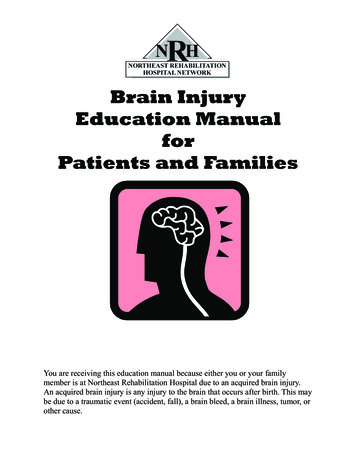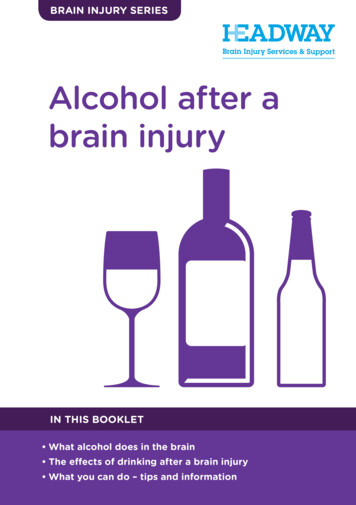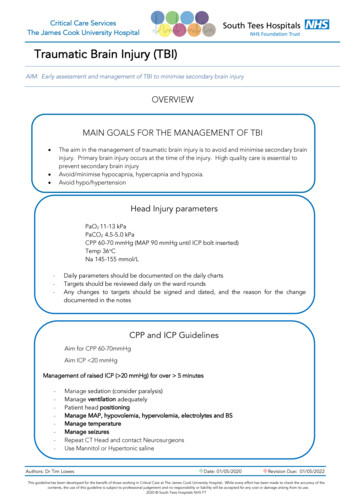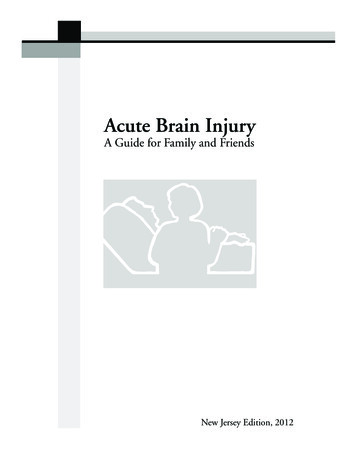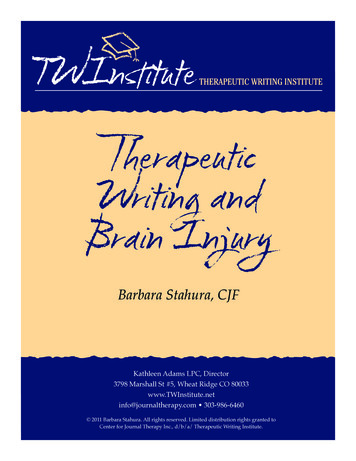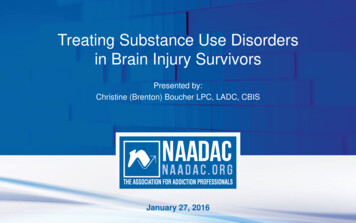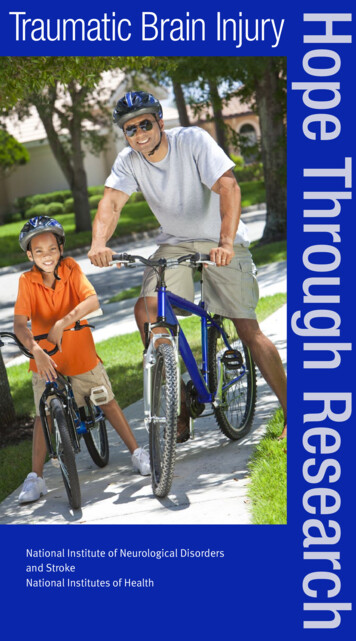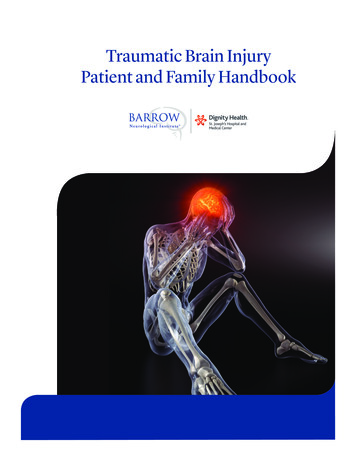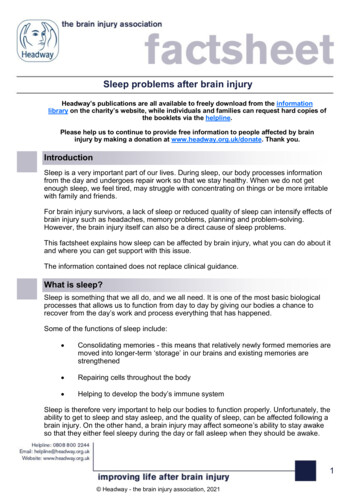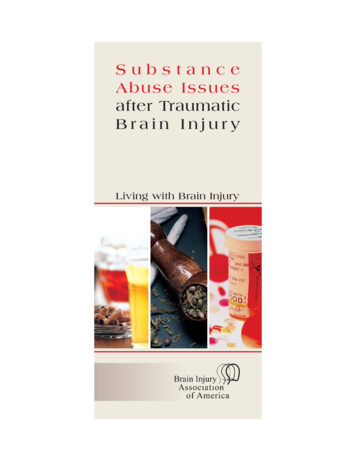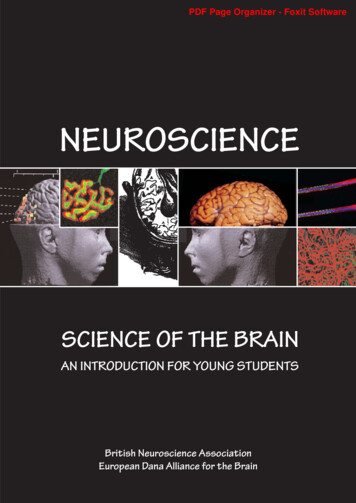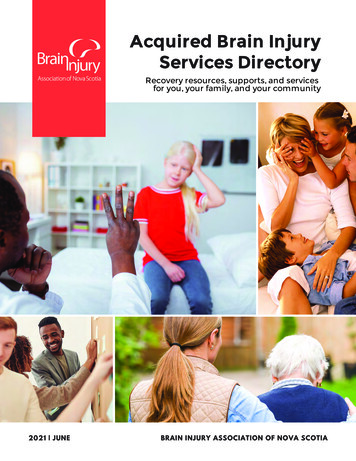
Transcription
Acquired Brain InjuryServices DirectoryRecovery resources, supports, and servicesfor you, your family, and your community2021 JUNEBRAIN INJURY ASSOCIATION OF NOVA SCOTIA
DISCLAIMER:While Brain Injury NS staff took care to prepare the information contained in this directory, such information was obtained from several sources, may not be current and is provided without charge.This information is intended for informational purposes only, is not intended to constitute medicaladvice, and should not be relied upon in any such regard.It is not intended to be a comprehensive or detailed statement concerning the matters addressed.The Brain Injury Association of Nova Scotia does not recommend or endorse the use of any service or provider described in or provided through this directory.A NOTE ABOUT THE IMPACT OF COVID-19:At the time of printing, Public Health restrictions due to the pandemic affected many service providers.Please contact organizations directly to inquire about the current availability of in-person programs, services or resources as many may have shifted online either temporarily or permanently.
Table of ContentsIntroduction2What to Consider3NeuroCommons4Professional Services5Child/Youth cational/Employment19Legal Services20Additional Resources21ABI Directory 1
IntroductionAt the Brain Injury Association of Nova Scotia, we understand how profoundly a brain injuryimpacts you and everyone close to you. With over 70,000 Nova Scotians affected by brain injury,we also understand how difficult it can be to find the services and supports that will help you andyour family with your recovery and return to life, work and the things you love to do.A recent investment to support brain injury as part of a 10-year federal funding commitment tomental health helps support initiatives recommended by the acquired brain injury advisory committee, an effort co-led by the Department of Health and Wellness and the Brain Injury Association of Nova Scotia. Partners include the IWK, Nova Scotia Health, Peter's Place, Strongest Families and the Brain Injury Association of Nova Scotia (Brain Injury NS).We are committed to building a community of support for people with brain injuries across NovaScotia through programs, education and resources, as well as tireless advocacy.This directory focuses primarily on publicly-funded or free/subsidized programs and servicesavailable to brain injury survivors and families across the province.To view an evergreen version of this directory, please visit our website – www.braininjuryns.com –or you may request hard copies of any of our resources by mail (contact details are below).Wherever possible, we have included phone numbers in the print directory for those without easyaccess to the internet. 211 NOVA SCOTIA is a free helpline that can connect you to many of thesecommunity and social services in your area 24 hours a day, 365 days a year and in over 150 languages.Call or text 211 or 1-855-466-4994, or visit https://ns.211.caA companion Caregiver Guide for this directory will be available in the upcoming 2nd edition withspecific resources to help families and caregivers of those with brain injuries.Additionally, Brain Injury NS has developed Concussion Information Cards in consultation withconcussion professionals in Nova Scotia for the most up-to-date information on concussion education, prevention, recovery, and more. These cards are available on our website and distributedin emergency rooms and other health facilities across the province.For more information:Brain Injury Association of Nova ScotiaMetro Community HUB3-615 Windmill RoadDartmouth, NSB3B 1B6902-422-5000 or 1-833-452-7246www.braininjuryns.comFor errors, outdated information or omissions, please contact info@braininjuryns.com.2 ABI Directory
What to considerIf you are experiencing a medical emergency, please call 911.If you are experiencing persistent symptoms related to your brain injury, consider starting withyour family doctor for referrals to appropriate specialists.In your search for a health care professional, it is helpful to ask for specific examples of their experience in treating symptoms of a brain injury, the assessment and treatment services they provide,how long treatment is usually needed, and any fees that may not be covered by MSI or extendedhealth insurance.When it comes to accessing the right non-medical support and help, filling out the paperworkcorrectly and completely can be overwhelming. Don’t let forms stand in the way of getting thehelp you need, especially when it comes to financial support and government documents. If youneed help completing forms, you may wish to contact:Dalhousie Social Work Community Clinic902-494-2753 or swcc@dal.caIndependent Living Nova Scotia (ILNS)902-453-0004 or 1-877-310-4567www.ilns.careachAbility AssociationOffers form-filling clinics on a drop-in basis to complete forms such as Criminal Record Pardons,lease agreements, applications, etc.902-429-5878 or 1-866-429-5878www.reachability.orgABI Directory 3
NeuroCommonsThe NeuroCommons opened its doors in 2020 to a new community-based Nova Scotia Health facility that clusters existingacquired brain injury (ABI) outreach and day programs in Central Zone together with Brain Injury NS and other key community partners to collaborate and expand support for people with acquired brain injuries and their families.Two of the programs based out of the NeuroCommons include the ABI Day Program and the ABI Outreach Team.The ABI Day Program offers outpatient therapy groups for people who have an acquired brain injury. The program is for peoplewho want to learn more about their injury, participate in meaningful activities, explore their strengths, and learn skills and strategies to manage symptoms.Participants must have the referral form completed by a healthcare professional, then participate in an intake assessment andregister for the program to attend.To attend the program, you must be: Diagnosed with an acquired brain injury (e.g., traumatic brain injury/concussion, stroke, brain tumours, meningitis/encephalitis,lack of oxygen to the brain)18 years of age and olderAble to participate in a group settingLiving within the province and have the means to access the program in person or onlineAble to manage self-care and medications during the program or have a caregiver to helpMedically stable and able to attend regular sessionsNeuroCommonsUnit 0290, Bedford Place Mall1658 Bedford HighwayBedford, NS B4A 2X9902-473-1229902-425-6574 (fax)The ABI Day Program has two parts – the introductory core program and the subsequent series programs. Core Program Hours - two days per week for 2.5 hours over six weeks (the schedule varies) Series Program Hours - two days per week for 1.5 hours over six weeks (the schedule varies, participants may choose to participate in more than one series program simultaneously)The ABI Outreach Team is a community-based health care service for people who have an acquired brain injury.The ABI Outreach Team accepts referrals from health care professionals for individuals residing within Nova Scotia Health CentralZone. Services are offered via home and community visits.Services are provided to clients with complex needs requiring a coordinated, interdisciplinary approach to care.The referral form can be completed and faxed to the Coordinator - ABI Ambulatory Care Teams.To be eligible for services of the ABI Outreach Team, you must be: Diagnosed with an acquired brain injury (e.g. traumatic brain injury, stroke, brain tumours, meningitis/encephalitis, lack ofoxygen to the brain)18 years of age and olderLiving within Nova Scotia Health Central ZoneReady and willing to work with the team to reach the goals agreed uponOpen to including family or support persons in reaching goalsABI Outreach902-473-4305Coordinator - ABI Ambulatory Care Teams902-473-1186902-425-6574 (fax)4 ABI Directory
An important note about insuranceSome health care services and programs are covered by Nova Scotia Medical Service Insurance (MSI) which Medavie Blue Crossadministers on behalf of the Nova Scotia government. This is usually when a health care professional is employed by a public institution like a hospital, school or correctional facility, but you should always ask for clarification.When professionals practise in the community in private practice, MSI may not cover their services. However, sometimes theseservices can be covered by private or extended health insurance plans, so always check with your insurance provider first to makesure that you understand any costs that they may not cover.For more information about MSI, you can call 902-496-7008 or 1-800-563-8880, or visit https://novascotia.ca/dhw/MSI/Professional ServicesWhile many professional disciplines can play a role in brain injury recovery, due to space constraints, we’ve limited our directoryscope to those listed below, emphasizing publicly funded services.Nova Scotia Health – Acquired Brain Injury (ABI) ServicesThe Acquired Brain Injury (ABI) Program comprises multiple services and interdisciplinary teams. The cornerstone of care is anorganized, programmatic approach to multidisciplinary assessment, treatment and education for survivors of traumatic andnon-traumatic brain injuries and their families: Inpatient Rehabilitation - 7th Floor ABI Unit, Nova Scotia Rehabilitation and Arthritis Centre (NSRAC)District Stroke ProgramABI Ambulatory Care ServicesABI Day Program (see NeuroCommons above)ABI Outreach Team (see NeuroCommons above)Concussion Education Sessions*Occupational TherapyPhysiotherapySocial WorkNeuropsychology*For more information on Concussion Education Sessions or to register online, visit https://abi.nshealth.ca/ or call 902-473-8610.ABI Directory 5
Locations:Nova Scotia Rehabilitation and Arthritis Centre1341 Summer StreetHalifax, NSB3H 4K4NeuroCommonsUnit 0290, Bedford Place Mall1658 Bedford HwyBedford, NSB4A 2X9Acquired Brain Injury Program Outpatient and Community ServicesFor questions or referrals, contact:902-473-1186Peter’s PlaceCommunity Rehabilitation ProgramTo improve self-sufficiency in every area possible, staff work inclusively with the individuals impacted by ABI and their familiesto establish and monitor goals. Comprehensive improvement assessments are done monthly. The purpose of this customizable12-week program is to allow an individual to remain more independent in their home, with their family and stay active within theircommunity. The program administrator assesses all referrals.902-481-0049www.petersplace.caLooking for a Family PracticeNova Scotia Health provides support for citizens looking for a family doctor or nurse practitioner. Call 811 or visithttps://needafamilypractice.nshealth.caMental Health and AddictionsThe hotlines listed here are toll-free and available to help 24/7 or go to your closest emergency department.Provincial Mental Health and Addictions Crisis Line:1-888-429-8167Kids Help Phone: 1-800-668-6868Text CONNECT to 686868Emergency: 911You’re not alone.Nova Scotia Health has an excellent five-minute tool on their website that will walk you through finding the right help as close tohome as possible. You will not be asked to provide your name or any other personally identifiable information.https://mha.nshealth.ca/en/helpYou can call the Intake Service if you prefer.1-855-922-1122Monday – Friday, 8:30 a.m. to 4:30 p.m.(The line has voicemail only on evenings, weekends, and statutory holidays.)2-V-1 Rulefor properly fitting helmets2fingers distance between eyebrowsand helmetV16 ABI Directorystraps form a "V" under earsfinger fits between chin and strap
Other resources:Canadian Mental Health Association (CMHA)Nova Scotia Division1-877-466-6606www.novascotia.cmha.caHope for Wellness Help LineOffers immediate mental health counselling and crisis intervention to all Indigenous peoples across Canada. Available 24 hours aday, seven days a week.1-855-242-3310A chat box to connect with a counsellor online is also available on their website.www.hopeforwellness.caImmigrant Services Association of Nova Scotia (ISANS)Offers counselling and crisis intervention services to support new immigrants.902-423-3607 or 1-866-431-6472www.isans.caFor a more comprehensive list of mental health resources in Nova Scotia, g/Audiologists and Speech-Language PathologistsProvide services in hospitals, clinics and schools across the province as well as in private practice.To find an audiologist or speech-language pathologist near you, visit:https://nscaslp.caChronic Pain Services and Pain ManagementChronic pain services help you manage pain and improve your health, function and well-being. Teams may include doctors, nurses, physiotherapists, occupational therapists, psychologists, social workers and other health care professionals who specialize inpain management.The Pain Self-Management Program (PSMP) is a 12-session interdisciplinary group program designed to help people withlong-term pain learn skills and non-medicinal ways of helping with pain relief and overall improved quality of life. Available acrossthe province. Call 211 or visit www.nshealth.ca to search for a list of programs and services for your nearest local PSMP program.Driver EvaluationIn Nova Scotia, doctors are responsible for deciding whether you are okay to drive or not. If they are unsure, they may refer you tothe Driver Evaluation Program offered by a team that includes a trained occupational therapist and a certified driving instructor.The program’s cost is not covered by public health insurance, although private or extended health insurance plans may cover thecost, so check with your provider. (The program has a funding coordinator who may also be able to help you with options.)Driver Evaluation ProgramNova Scotia Rehabilitation and Arthritis Centre, 1341 Summer Street, First FloorHalifax NS B3H th.ca/files/patientinformation/1824.pdfHearing and Speech Nova Scotia (HSNS)Provides quality audiology services to all Nova Scotians and speech-language services to preschool children, home schoolchildren, and adults. HSNS is accredited by Accreditation Canada and provides services from 34 clinic sites in 25 communitiesthroughout Nova Scotia. Most services are provided at no cost to Nova Scotian residents with a valid health card.902-492-8289 or /PsychologyNeuropsychology is part of the interdisciplinary approach with Nova Scotia Health ABI Services. Psychologists also work in privatepractices and may be covered by your private or extended health insurance plan. To find a local psychologist with experience inbrain injury, visit the Association of Psychologists in Nova Scotia, select Find a Psychologist and choose “brain injury” under Area ofPractice.www.apns.caABI Directory 7
Occupational TherapyOccupational therapy is part of the interdisciplinary approach with Nova Scotia Health ABI Services. Occupational therapists workat most sites within Nova Scotia Health in both mental health and physical medicine settings. Occupational therapists are primarycare professionals. For referral forms and telephone numbers of locations across the cupational%20TherapySuppose you have private or extended health insurance coverage. In that case, you can search the College of Occupational Therapists of Nova Scotia (COTNS) to find an occupational therapist in private practice near you.www.cotns.caPhysiotherapyPhysiotherapy is part of the interdisciplinary approach with Nova Scotia Health ABI Services. In Nova Scotia, physiotherapy is paidfor by the province’s health care system and available as an outpatient service at your local hospital without a health care provider’s note. For local contact information for publicly-funded physiotherapy, yPhysiotherapy is also available privately by calling your local physiotherapy clinic. While you won’t need a health care provider’snote if you are paying for physiotherapy yourself, if you were injured at work or covered by a private or extended health insuranceplan, you might need a note. In some cases, you may need to see a physiotherapist at an approved clinic.To find a local physiotherapist, call 211 or visit the Nova Scotia Physiotherapy Association:www.physiotherapyns.caor the Nova Scotia College of Physiotherapists:www.nsphysio.comSocial WorkSocial work is part of the interdisciplinary approach with Nova Scotia Health ABI Services and a vital piece of the puzzle in providing counselling and education and connecting you with local community resources. For publicly-funded social workers underNova Scotia Health, referrals can be made by patients, family members, friends, community agencies, or any member of yourinterdisciplinary health care team. To find a local publicly-funded social worker, n Halifax, the Dalhousie Social Work Community Clinic is an excellent resource:Dalhousie Social Work Community Clinic902-494-2753Social workers also work in private practices and may be covered by your private or extended health insurance plan. To find a localsocial worker with experience in acquired brain injury, contact the Nova Scotia College of Social Workers.902-429-7799www.nscsw.orgNative Social Counselling AgencyAssists off-reserve Aboriginal clients facing social problems and conditions with confidential support and referral counselling-agency/Vision - OptometristsMost vision services – by optometrists, for example – are not usually covered by public health insurance. However, sometimesservices can be covered by private or extended health insurance plans. When researching vision care options, ask if your visionhealth care provider has experience treating patients with brain injuries. To find a local optometrist, visit the Nova Scotia College ofOptometrists:https://nsco.ca8 ABI Directory
Child/Youth ResourcesPEDIATRIC REHABILITATION SERVICES AT IWKProvides services to children and youth with physical disabilities resulting in functional change. Includes the Infant and PreschoolTherapy Team, Community and School Therapy Team, Specialty Seating, Augmentative and Alternative Communication, Recreation Therapy, Pediatric Preschool Psychology Service, and Neuropsychology. Some services are HRM specific, while others areprovincial or Maritime services.The Village News is a resource developed by this service to help you stay informed and inspired.Inpatient Rehab TeamThe Inpatient Rehab Team at the IWK is made up of many different health care professionals. The team provides intensive rehabservices to infants, children and youth who have a functional impairment resulting from injury, illness or following surgery.The team will: Help you and your child understand your child’s conditionWork with you and your child to identify functional goalsHelp your family prepare for going homeSupport your family as you adapt to life after an injury or illnessHelp your child make the best recovery possible, including:How they moveHow they participate in daily activitiesHow they communicateHow they feel about themselvesHow they get along with othersHow they learnHelp your school understand your child’s needs and help plan for their return to schoolHelp link your family with people or services in your home community that may be helpfulOther services offered by the IWK:The Brain Tumour Clinic provides specialized care for children and youth in the Maritimes who have a brain tumour. They use aninterdisciplinary team to provide treatment and support for patients and families. Supportive care is a crucial component of thetreatments they offer and includes blood product administration, drugs to minimize side effects, nutritional support, psychosocialsupport, physiotherapy and occupational therapy.Other programs and services available to children and youth with acquired brain injuries are listed below. A referral may be required for some programs.Acadia University’s SMILE ProgramThe SMILE (Sensory Motor Instructional Leadership Experience) program provides persons with varying disabilities a unique physical activity experience to improve their total development. Free.902-585-1477 (Wolfville)https://smile.acadiau.ca/home.htmlBest BuddiesOffers school programs that help create lasting friendships between people with and without an intellectual or developmentaldisability (IDD) as well as brain injuries. The ultimate goal is to make every school and community across Canada more inclusiveand accepting. Free.For participating schools across Nova Scotia, visit:www.bestbuddies.caBrigadoon VillageDelivers year-round camp programming to children, youth and families living with health conditions or other life challenges inAtlantic Canada, including Camp Brainiac (neurosurgery conditions), Camp Carpe Diem (epilepsy) and Camp Good Times (braintumour).A pay-what-you-can fee structure is available. No camper in Atlantic Canada will ever be turned away due to a financial situation.902-681-8100 or 1-888-471-5666www.brigadoonvillage.orgABI Directory 9
Camp TriumphFor children who have a sibling or parent with a severe chronic illness or disability. Free. Email is best: info@camptriumph.ca.www.camptriumph.caClub InclusionProvides social, cultural and recreational programs accessible to all people with disabilities to enrich lives by building friendships,community and success. Reduced rates and bursaries are available. d Smile & Shine ProgramPromotes potential in families who have children with special needs or behavioural challenges through support, education, advocacy and partnerships. Free.902-667-8244 (Cumberland County)www.cumberlandeip.caDalhousie BEAM – Because Everyone’s Ability MattersStudents from various health care programs volunteer to work and play with children who have a wide range of physical and cognitive disabilities. The goal is to provide a safe and friendly environment for these children (0-17 years) and their families. Free. Emailis best: dalhousiebeam@gmail.com. (HRM)Early Childhood Development Intervention ServicesPart of a range of community-based services and supports designed to strengthen families, improve parenting skills and fosterhealthy child development. (Province-wide)1-844-292-6730www.nsecdis.caParents of Complex Children of the MaritimesAn online support group where parents can share tips and tricks. Email Jackie Pidduck to receive the meeting link: jacklynn.pidduck@iwk.nshealth.ca.Strongest Families InstituteOffers evidence-based, bilingual mental health programs and services for children/youth, adults, and families. Free. .com10 ABI Directory
FinancialNon-Profit Trustee ServicesVeith HouseProvides trustee services voluntarily with financial management and budgeting support for clients involved with Income trustee-servicesWelcome Housing and Support ServicesOffers a trustee program to help clients who struggle to pay their bills in full and on time or who have lost their housing because oflate payment in the past. stee-servicesCredit CounsellingAt the time of printing, the Province of Nova Scotia had suspended their Debtor Assistance programs through Service Nova Scotiadue to COVID-19. It is unclear if this service will resume in the future.Suppose you are experiencing difficulty with your creditors and need help. In that case, Service Nova Scotia recommends that youcontact the Government of Canada’s Office of the Superintendent of Bankruptcy for more information and find a Licensed Insolvency e/bsf-osb.nsf/eng/h br01854.htmlFinancial AssistanceWhile there are several possibilities for financial assistance that may be of help in your particular situation due to space constraints,we’ve included a limited list of critical federal and provincial programs below as a starting point. Information can become outdatedquickly, so visit websites for the most current details.Government of Canada – Financial SupportEmployment Insurance (EI) Sickness BenefitEI sickness benefits can provide you with up to 15 weeks of financial assistance if you cannot work for medical reasons. You couldreceive 55% of your earnings up to a maximum of 573 a week. You must get a medical certificate to show that you are unable towork for medical vices/benefits/ei/ei-sickness.htmlIf your medical condition is expected to be long-term or permanent, you may be eligible for other benefits such as CPP-Disability.The Canada Pension Plan Disability Benefit (CPP-D)Designed to provide partial income replacement to eligible CPP contributors under the age of 65 with a severe and disability-benefit.htmlDisability Tax Credit (DTC)A non-refundable tax credit that helps persons with disabilities or their supporting persons reduce the amount of income tax theymay have to pay.Being eligible for the DTC can open the door to other federal and provincial programs such as the Registered Disability SavingsPlan, the Canada Workers Benefit, and the Child Disability -tax-credit.html#lgbltABI Directory 11
Note: Beware of for-profit companies who charge exorbitant ‘contingency fees’ (as much as 30% HST) to apply for the DTC onyour behalf.(The Disability Tax Credit Promoters Restrictions Act (DTCPRA) was enacted to limit the fees that can be accepted or charged, directly or indirectly, by a promoter who makes a disability tax credit request under the Income Tax Act on behalf of a claimant. At thetime of printing, the Act had not yet come into force.) For step-by-step instructions for completing T2201, -step-instructions-filling-form-t2201.html For help with filling out the DTC form, you may also contact the Dalhousie Social Work Community Clinic or IndependentLiving Nova Scotia.Dalhousie Social Work Community Clinic902-494-2753 or swcc@dal.caIndependent Living Nova Scotia (ILNS)At the time of printing, ILNS had just launched a new automated email navigation system to support persons with disabilitiesthrough the Disability Tax Credit and Registered Disability Savings Plan process.For more information:902-453-0004 or 1-877-310-4567www.ilns.caRegistered Disability Savings Plan (RDSP)A savings plan intended to help parents and others save for the long-term financial security of a person eligible for the DisabilityTax Credit. If you qualify, there are two contributions made by the government:Canada Disability Savings BondThe bond is an amount paid by the Government of Canada directly into an RDSP. The Government will pay bonds of up to 1,000 ayear to low-income Canadians with disabilities.No contributions have to be made to get the bond. The lifetime bond limit is 20,000. A bond can be paid into an RDSP until theyear in which the beneficiary turns 49.Canada Disability Savings GrantThe grant is an amount that the Government of Canada pays into an RDSP. The Government will pay matching grants of 300%,200%, or 100%, depending on the beneficiary’s adjusted family net income and the amount ility-savings-plan-rdsp.htmlCanada Revenue Agency (CRA) – Free Tax ClinicsThe CRA’s Community Volunteer Income Tax Program partners with community organizations and libraries across Nova Scotia tooffer free tax clinics for those with a modest income and a simple tax situation. Typically available in March and April.To find a local tax clinic, ee-tax-helpProvince of Nova Scotia – Financial SupportDisability Support Program (DSP)Assists persons in need under the mandate of the Social Assistance Act. It provides support to children, youth and adults withdisabilities through residential and at-home support programs.DSP Support Options range from supporting families who care for a family member with a disability in their own home to helpingpeople with disabilities in a 24-hour residential support option.To learn more about Income Assistance eligibility from the Department of Community employment/income assistance/HowtoApply.htmlAlso, see the next section on Housing.12 ABI Directory
Essential programs offered by the Department of Community Services include:Alternative Family Support Program (AFS)Supports persons with disabilities in an approved, private family home. The program provides a family-like setting for individualswho may require varying support and supervision levels, who may prefer living with a family, and who will benefit from the additional support a family environment can provide.Flex Individualized Funding Program (Flex)Flex provides individualized funding to participants living at home with their families or who live independently with support fromtheir families or personal support networks.A full list of disability programs under DCS is available lFor telephone numbers of your local DCS office, call 1-877-424-1177 or visit:www.novascotia.ca/
A recent investment to support brain injury as part of a 10-year federal funding commitment to mental health helps support initiatives recommended by the acquired brain injury advisory com-mittee, an effort co-led by the Department of Health and Wellness and the Brain Injury Associa-tion of Nova Scotia.
